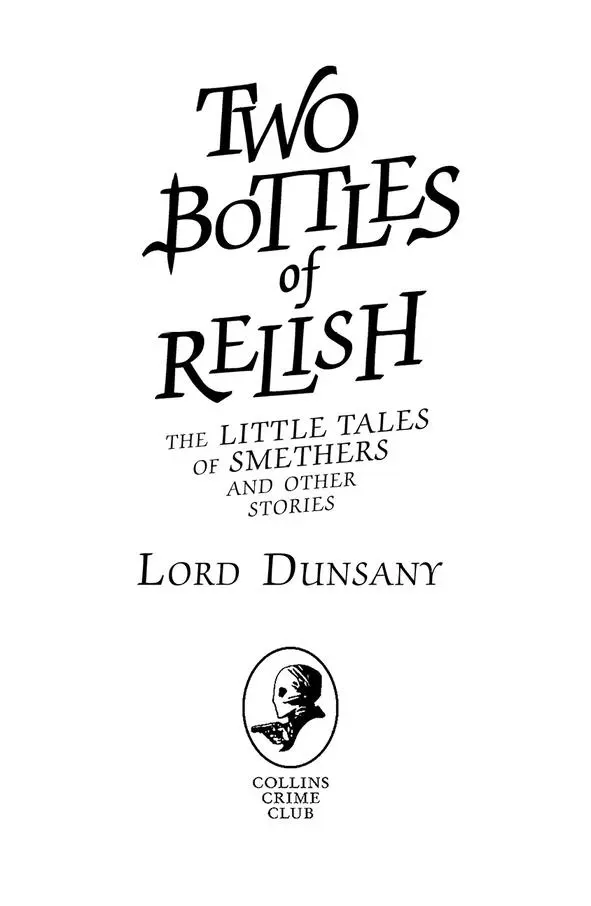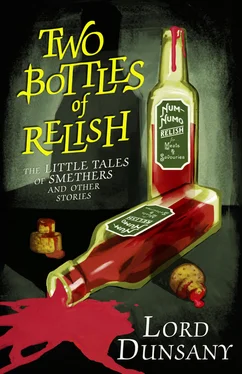
Published by COLLINS CRIME CLUB
An imprint of HarperCollins Publishers Ltd
1 London Bridge Street
London SE1 9GF
www.harpercollins.co.uk
First published in Great Britain as The Little Tales of Smethers by Jarrolds 1952
Copyright © The Trustees of the Dunsany Wills Trust 1952
Lord Dunsany asserts the moral right to be identified as the author of this work.
Introduction by Ellery Queen from Queen’s Quorum: A History of the Detective-Crime Short Story as Revealed by the 125 Most Important Books Published in this Field since 1845 published by Biblo and Tannen, New York, 1948
Cover design and illustration by Mike Topping © HarperCollins Publishers 2016
A catalogue copy of this book is available from the British Library.
This novel is entirely a work of fiction. The names, characters and incidents portrayed in it are the work of the author’s imagination. Any resemblance to actual persons, living or dead, events or localities is entirely coincidental.
All rights reserved under International and Pan-American Copyright Conventions. By payment of the required fees, you have been granted the non-exclusive, non-transferable right to access and read the text of this e-book on screen. No part of this text may be reproduced, transmitted, downloaded, decompiled, reverse engineered, or stored in or introduced into any information storage and retrieval system, in any form or by any means, whether electronic or mechanical, now known or hereinafter invented, without the express written permission of HarperCollins.
Source ISBN: 9780008159368
Ebook Edition © November 2016 ISBN: 9780008159375
Version: 2016-08-23
Table of Contents
Cover
Title Page
Copyright
Introduction
The Two Bottles of Relish
The Shooting of Constable Slugger
An Enemy of Scotland Yard
The Second Front
The Two Assassins
Kriegblut’s Disguise
The Mug in the Gambling Hell
The Clue
Once Too Often
An Alleged Murder
The Waiter’s Story
A Trade Dispute
The Pirate of the Round Pond
A Victim of Bad Luck
The New Master
A New Murder
A Tale of Revenge
The Speech
The Lost Scientist
The Unwritten Thriller
In Ravancore
Among the Bean Rows
The Death-Watch Beetle
Murder by Lightning
The Murder in Netherby Gardens
The Shield of Athene
About the Book
About the Author
About the Publisher
ONE of the most unforgettable short stories of detection-and-horror ever written—Lord Dunsany’s ‘The Two Bottles of Relish’, about detective Linley—first appeared in book form in an anthology titled Powers of Darkness (London: Philip Allan, 1934). The story, an unqualified tour de force , has an interesting and revealing history. Lord Dunsany was amused to notice that people were reading gruesome stories of murder in preference to his own more delicate tales. He wondered if he could write a story ‘gruesome enough for them’. So, with ’tec tongue in cheek but writing with grim seriousness, Lord Dunsany fashioned ‘The Two Bottles of Relish’.
The story proved ‘gruesome enough’—indeed, it far exceeded Lord Dunsany’s original intent. Editors were fascinated by the tale, but they frankly confessed that it made them ill. As a matter of fact, no male editor in England or America would publish the story. Finally, a woman dared—Lady Rhondda, who printed it in Time and Tide , November 12-19, 1932. Lord Dunsany has always thought that Lady Rhondda, a militant feminist, published the story as an example of sheer realism, saying to herself, ‘That is just how men do treat women.’ Gradually the widespread nausea (to use Lord Dunsany’s own phrase) seems to have worn off …
Lord Dunsany informs us that there are seven other tales about detective Linley, and that he hopes to include all eight in his 1951 volume of short stories. Needless to say, this book, when published, will be selected for Queen’s Quorum , for if Lord Dunsany had written only the very first tale of detective Linley, without the seven ‘sequels’, this single achievement would have earned Mr Linley’s creator a permanent seat at King Edgar’s Round Table.
ELLERY QUEEN
1948
THE TWO BOTTLES OF RELISH
SMETHERS is my name. I’m what you might call a small man, and in a small way of business. I travel for Numnumo, a relish for meats and savouries; the world-famous relish I ought to say. It’s really quite good, no deleterious acids in it, and does not affect the heart; so it is quite easy to push. I wouldn’t have got the job if it weren’t. But I hope some day to get something that’s harder to push, as of course the harder they are to push, the better the pay. At present I can just make my way, with nothing at all over; but then I live in a very expensive flat. It happened like this, and that brings me to my story. And it isn’t the story you’d expect from a small man like me, yet there’s nobody else to tell it. Those that know anything of it besides me, are all for hushing it up. Well, I was looking for a room to live in in London when first I got my job; it had to be in London, to be central; and I went to a block of buildings, very gloomy they looked, and saw the man that ran them and asked him for what I wanted; flats they called them; just a bedroom and a sort of a cupboard. Well, he was showing a man round at the time who was a gent, in fact more than that, so he didn’t take much notice of me, the man that ran all those flats didn’t, I mean. So I just ran behind for a bit, seeing all sorts of rooms, and waiting till I could be shown my class of thing. We came to a very nice flat, a sitting-room, bedroom and bathroom, and a sort of little place that they called a hall. And that’s how I came to know Linley. He was the bloke that was being shown round.
‘Bit expensive,’ he said.
And the man that ran the flats turned away to the window and picked his teeth. It’s funny how much you can show by a simple thing like that. What he meant to say was that he’d hundreds of flats like that, and thousands of people looking for them, and he didn’t care who had them or whether they all went on looking. There was no mistaking him, somehow. And yet he never said a word, only looked away out of the window and picked his teeth. And I ventured to speak to Mr Linley then; and I said, ‘How about it, sir, if I paid half, and shared it? I wouldn’t be in the way, and I’m out all day, and whatever you said would go, and really I wouldn’t be no more in your way than a cat.’
You may be surprised at my doing it; and you’ll be much more surprised at him accepting it; at least, you would if you knew me, just a small man in a small way of business; and yet I could see at once that he was taking to me more than he was taking to the man at the window.
‘But there’s only one bedroom,’ he said.
‘I could make up my bed easy in that little room there,’ I said.
‘The hall,’ said the man looking round from the window, without taking his tooth-pick out.
‘And I’d have the bed out of the way and hid in the cupboard by any hour you like,’ I said.
He looked thoughtful, and the other man looked out over London; and in the end, do you know, he accepted.
‘Friend of yours?’ said the flat man.
‘Yes,’ answered Mr Linley.
It was really very nice of him.
I’ll tell you why I did it. Able to afford it? Of course not. But I heard him tell the flat man that he had just come down from Oxford and wanted to live for a few months in London. It turned out he wanted just to be comfortable and do nothing for a bit while he looked things over and chose a job, or probably just as long as he could afford it. Well, I said to myself, what’s the Oxford manner worth in business, especially a business like mine? Why, simply everything you’ve got. If I picked up only a quarter of it from this Mr Linley I’d be able to double my sales, and that would soon mean I’d be given something a lot harder to push, with perhaps treble the pay. Worth it every time. And you can make a quarter of an education go twice as far again, if you’re careful with it. I mean you don’t have to quote the whole of the Inferno to show that you’ve read Milton; half a line may do it.
Читать дальше













